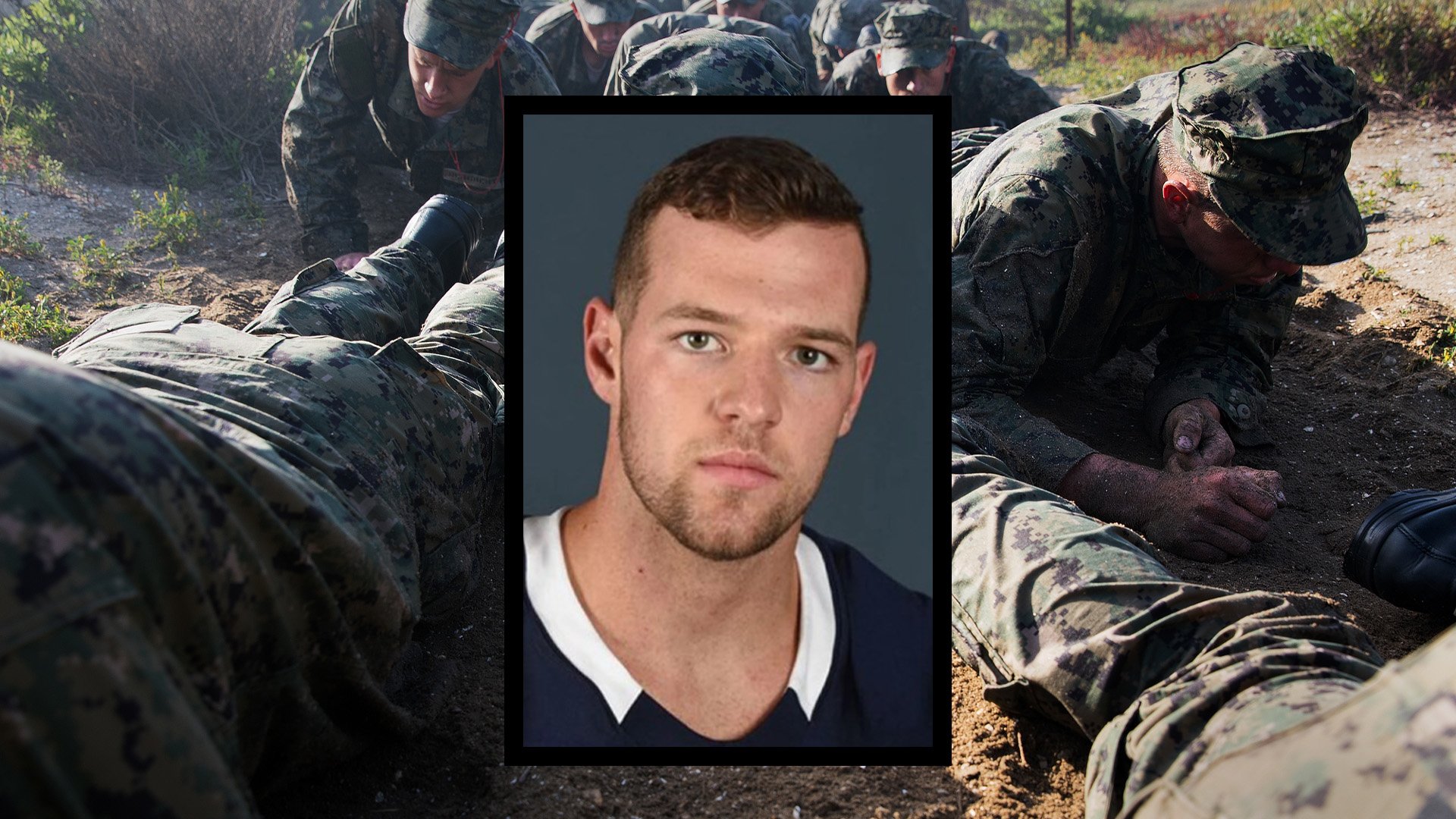
Seaman Kyle Mullen, the Navy seal candidate who died Feb. 4, 2022, after completing SEAL “Hell Week,” did nothing to cause his own death, according to a Navy probe. Coffee or Die Magazine composite.
Although they were found in his belongings, performance-enhancing drugs didn't kill Seaman Kyle Mullen, the Navy SEAL candidate who died Feb. 4 after completing SEAL “Hell Week,” according to a US Navy line of death report.
Released Wednesday, Oct. 12, the probe concluded that no actions by the 24-year-old former college football player contributed to his own death, which an Armed Forces Medical Examiner’s autopsy report blamed on acute pneumonia complicated by an enlarged heart, a condition called cardiomegaly.
“Our deepest sympathy extends to Seaman Mullen’s family and friends during this difficult time,” said Rear Adm. Keith Davids, the commander of the California-based Naval Special Warfare Command, in a prepared statement.
A third investigation by Naval Education and Training Command continues. It’s probing whether the Navy should fix broader problems exposed by Mullen’s death.
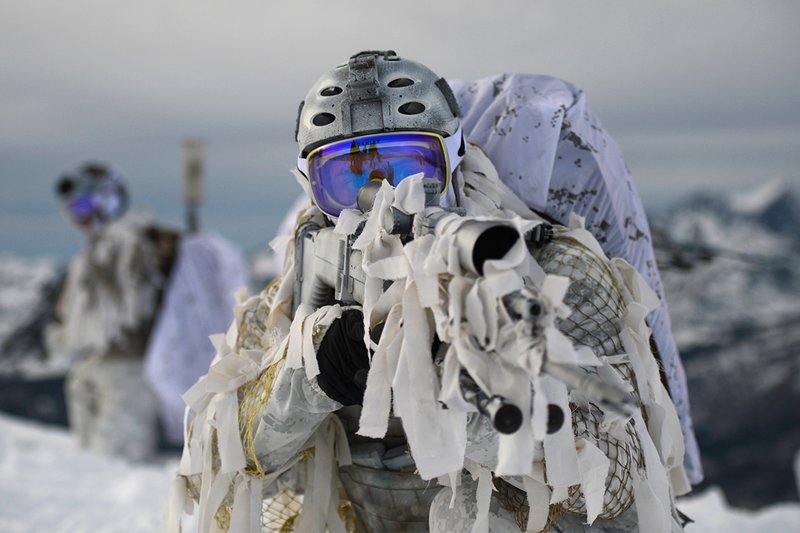
Navy SEALs demonstrate winter warfare capabilities Dec. 9, 2014, at Mammoth Lakes, California. Naval Special Warfare Command photo.
In his statement, Davids said his command “remains committed to transparency and we welcome the opportunity to review our assessment and selection programs, and help us look for additional ways to improve and prevent this kind of tragedy from happening again.”
“Kyle’s death will not be in vain," he continued. “We have a moral obligation to learn everything we can from Kyle’s tragic death so that we can ensure the safety of all future candidates.”
WARCOM already has launched a cardiac and performance-enhancing drugs screening program for incoming SEAL candidates; hiked prevention measures for pneumonia; and created a 24-hour observation period after high-stress Basic Underwater Demolition/SEALsPhase 1 Assessment and Selection events.
Officials also announced that non-punitive letters of reprimand were given to Capt. Brad Geary, the ex-commanding officer of the Naval Special Warfare’s Basic Training Command, and Capt. Brian Dreschsler, the commodore of the Naval Special Warfare Center.
WARCOM spokesperson Cmdr. William B. Tisdale told Coffee or Die Magazine a third person, "a senior medical staff under their command," also received administrative sanction.
Their actions, he added, are also being reviewed by Naval Education and Training Command investigators.
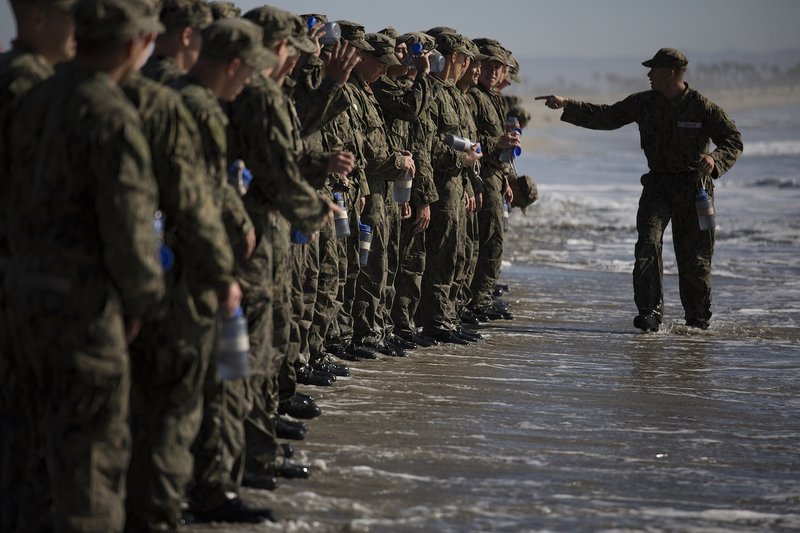
US Navy SEAL candidates participate in Basic Underwater Demolition/SEAL (BUD/S) training. SEALs are the maritime component of US Special Forces and are trained to conduct a variety of operations from the sea, air and land. US Navy photo by Petty Officer 1st Class Abe McNatt.
According to the line of death report approved Sept. 12 by Rear Adm. Davids, Mullen became a heat casualty during the grueling BUD/S training on Aug. 16, 2021.
He was rolled from his BUD/S class into a remedial training program to rehabilitate. In late 2021, Mullen was granted a medical waiver to resume BUD/S training. He was placed in Class 352 on Jan. 4, 2022.
In his first week of training, others observed that Mullen was struggling to breathe, a problem his fellow candidates chalked up to SIPE — Swimming Induced Pulmonary Edema, which is exacerbated by repeated physical activity in cold water, a hallmark of BUD/S training.
Classic SIPE symptoms include coughing up pink or bloody fluids from the lungs and shortness of breath, but they tend to disappear after a couple of days.
The candidates didn't report Mullen's problems to medical caregivers, and medical staffers also never detected the breathing problems.
Although other candidates were placed on a SIPE watch list, Mullen's name was never added.
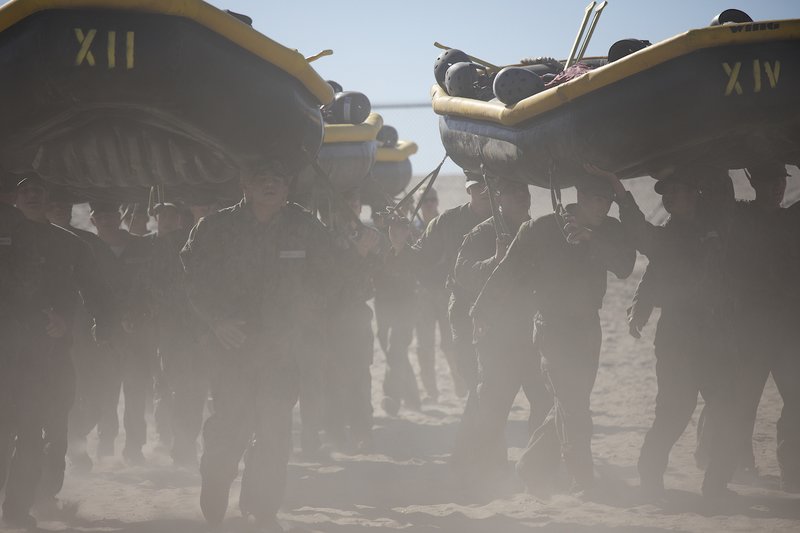
US Navy SEAL candidates participate in Basic Underwater Demolition/SEAL (BUD/S) training. US Navy photo by Petty Officer 1st Class Abe McNatt.
Between Jan. 30 and Feb. 4, Mullen entered Hell Week, what WARCOM describes as a "crucible event" that's designed to replicate the rigors of irregular warfare.
Medical staffers treated Mullen for swelling, numbness and tingling below his knee, and shortness of breath, according to the line of death report. The swelling was discounted because nearly all the other SEAL candidates were suffering from the same problem.
On the final morning of the event, corpsmen heard abnormally low and coarse sounds and high-pitched crackles in his lungs — called rales and rhonchi — and twice administered supplemental oxygen.
SIPE can trigger rales and rhonchi, but so can heart failure and infections like pneumonia.
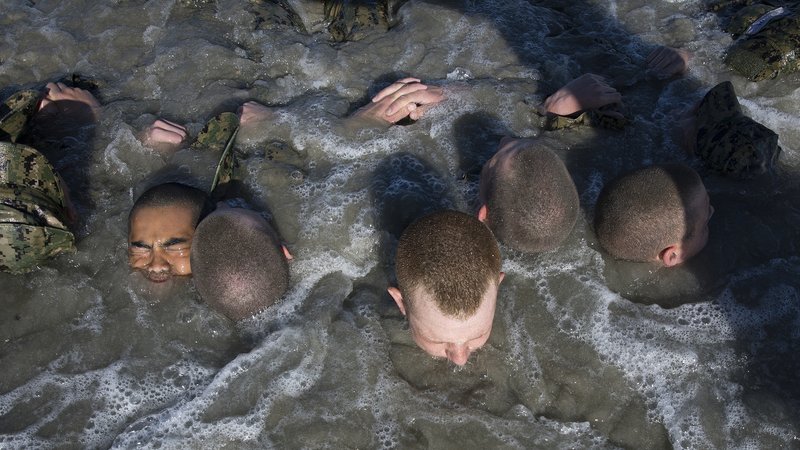
US Navy SEAL candidates participate in Basic Underwater Demolition/SEAL (BUD/S) training. US Navy photo by Petty Officer 1st Class Abe McNatt.
The Armed Forces Medical Examiner concluded that Mullen was being “looked after by non-medical personnel to help him tend to his basic needs.” Forensic investigators described him as in a wheelchair, unable to walk, coughing and spitting up so much “red-tinged fluid” that it filled a sport drink bottle.
According to the line of death report, he was placed in the wheelchair because of the tingling and pain in his legs. And initially his oxygen saturation reading was a healthy 98%, but others in the class rated his medical condition as the worst of all the candidates.
By late afternoon, his condition had deteriorated. The line of duty report described the "super swollen" and "bluish" Mullen "gasping for air" and spitting fluids from his mouth.
When Federal Fire Department personnel arrived at the facility, Mullen was unresponsive. They rushed him to Sharp Coronado Hospital, where he was declared dead.
The line of death report revealed that it's typical for up to three SEAL candidates in each class to visit an emergency room after crucible training.
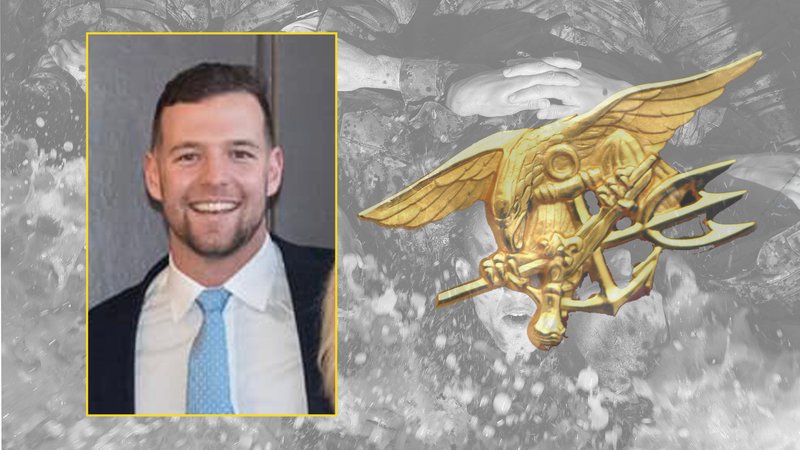
Kyle Mulllen died of pneumonia hours after completing "Hell Week" at BUD/S, the selection course for Navy SEAL candidates. Photo courtesy Emily Kelly, Navy photo by Petty Officer 1st Class Abe McNatt.
The Armed Forces Medical Examiner named Streptococcus pyogenes, a bacteria that can trigger lethal toxic shock in humans, as the primary cause of death, which had been exacerbated by a swollen heart.
According to the line of death report, Class 352 never got jabbed with COVID-19 boosters because officials were concerned about the rare likelihood of myocarditis, the inflammation of the heart muscle.
Navy experts in pulmonary care, infectious diseases, cardiology, sports medicine, allergies, and immunology reviewed the evidence and agreed with the autopsy's findings, but failed to reach consensus on whether other factors contributed to Mullen's death.
An unnamed cardiologist in the report wrote that those factors included "the use of prohibited performance enhancing drugs (PEDs), possible swimming induced pulmonary edema (SIPE), and the rigorous physical demands of BUD/S Assessment and Selection."

US Navy SEAL candidates participate in Basic Underwater Demolition/SEAL (BUD/S) training in Coronado, California, on Jan. 23, 2018. US Navy photo by Petty Officer 1st Class Abe McNatt.
The line of death report revealed other red flags that medical staffers appeared to miss, including Mullen passing out, asleep, on the toilet, and falling behind the rest of his team while toting a boat across the sand and mud flats.
But medical staffers see a lot of candidates falling asleep during Hell Week, and they blamed his knee pain and swollen legs for his lagging behind during the boat drills.
Like the cardiologist's report, Naval Criminal Investigative Service agents initially suspected performance-enhancing drugs such as steroids, synthetic human growth hormones, or erectile dysfunction medication such as Viagra might've played a role in the SEAL candidate's death, according to NCIS reports attached to the line of death investigation.
Viagra, one candidate told NCIS, was rumored to ward off SIPE, and the medical experts said the drug had been investigated as a possible way of warding off the condition.
But none of the other candidates or instructors believed Mullen ever tried to enhance his performances with drugs, agents wrote.
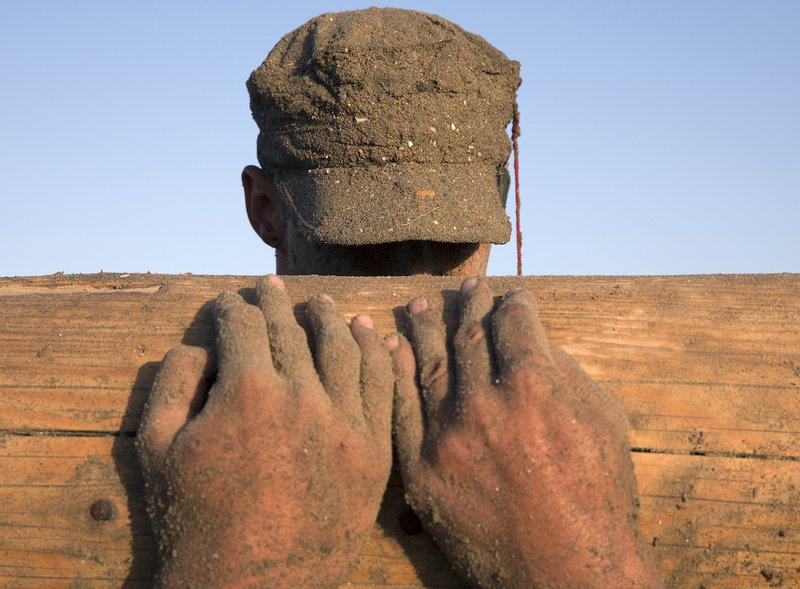
A Navy SEAL candidate does log physical therapy during Basic Underwater Demolition/SEAL training. US Navy photo by Petty Officer 1st Class Abe McNatt.
Those eyewitness interviews conflicted with another heavily redacted report from an unnamed Navy captain dragooned to become an expert on emergency medicine and toxicology for the probe.
The captain revealed that Mullen "was in possession of and suspected of misusing several PEDs, to include Anastrobol (anastrozole – an aromatase inhibitor), recombinant human growth hormone, and testosterone cypionate."
All three of those compounds will increase muscle mass and could be associated with both cardiomegaly and sudden cardiac death, the captain wrote.
Another medical expert revealed that Mullen's belongings contained Viagra, to prevent SIPE, but no one could determine if or when the SEAL candidate took the drugs, the amounts that might've been ingested, and the frequency of the doses.
And even if he was using those drugs during SEAL training, it wasn't clear if they contributed to his death, according to other experts consulted by the Navy.
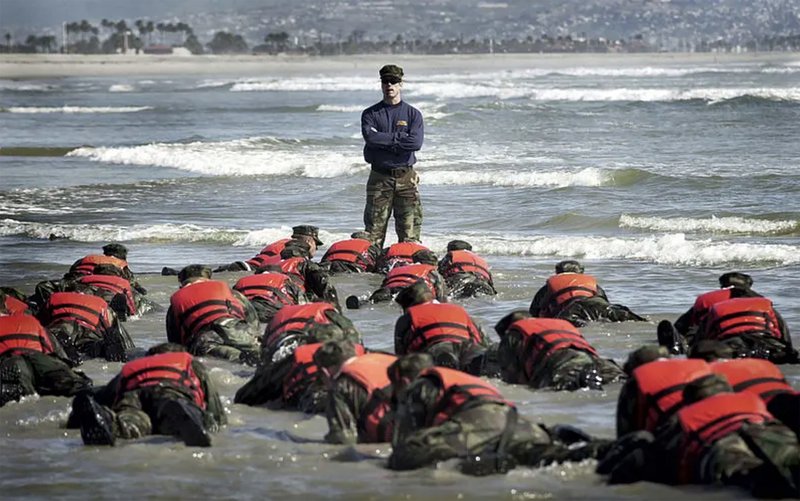
SEAL candidates experience BUD/S training in Coronado, California. US Navy photo.
One of the experts noted that Mullen packed on 22 pounds during Hell Week, seven times the typical weight gain of SEAL candidates, and his heart's size had grown "64.7% over the upper limit of the reference range."
He concluded that Mullen's "exposure to anabolic agents may have been large," but it also was possible that these ailments were tied to renal or heart failure.
<hr>
This is a breaking story and Coffee or Die Magazine will continue updating it.
Read Next: New Bill Could Force Changes to Medical Care at BUD/S for SEAL Trainees

Carl Prine is a former senior editor at Coffee or Die Magazine. He has worked at Navy Times, The San Diego Union-Tribune, and Pittsburgh Tribune-Review. He served in the Marine Corps and the Pennsylvania Army National Guard. His awards include the Joseph Galloway Award for Distinguished Reporting on the military, a first prize from Investigative Reporters & Editors, and the Combat Infantryman Badge.
BRCC and Bad Moon Print Press team up for an exclusive, limited-edition T-shirt design!
BRCC partners with Team Room Design for an exclusive T-shirt release!
Thirty Seconds Out has partnered with BRCC for an exclusive shirt design invoking the God of Winter.
Lucas O'Hara of Grizzly Forge has teamed up with BRCC for a badass, exclusive Shirt Club T-shirt design featuring his most popular knife and tiomahawk.
Coffee or Die sits down with one of the graphic designers behind Black Rifle Coffee's signature look and vibe.
Biden will award the Medal of Honor to a Vietnam War Army helicopter pilot who risked his life to save a reconnaissance team from almost certain death.
Ever wonder how much Jack Mandaville would f*ck sh*t up if he went back in time? The American Revolution didn't even see him coming.
A nearly 200-year-old West Point time capsule that at first appeared to yield little more than dust contains hidden treasure, the US Military Academy said.












